英语专八常见相似词辨析
- 格式:doc
- 大小:31.50 KB
- 文档页数:4
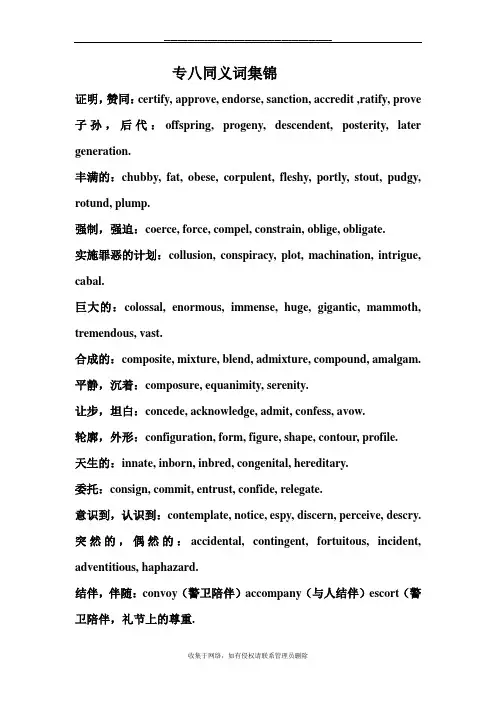
专八同义词集锦证明,赞同:certify, approve, endorse, sanction, accredit ,ratify, prove 子孙,后代:offspring, progeny, descendent, posterity, later generation.丰满的:chubby, fat, obese, corpulent, fleshy, portly, stout, pudgy, rotund, plump.强制,强迫:coerce, force, compel, constrain, oblige, obligate.实施罪恶的计划:collusion, conspiracy, plot, machination, intrigue, cabal.巨大的:colossal, enormous, immense, huge, gigantic, mammoth, tremendous, vast.合成的:composite, mixture, blend, admixture, compound, amalgam. 平静,沉着:composure, equanimity, serenity.让步,坦白:concede, acknowledge, admit, confess, avow.轮廓,外形:configuration, form, figure, shape, contour, profile.天生的:innate, inborn, inbred, congenital, hereditary.委托:consign, commit, entrust, confide, relegate.意识到,认识到:contemplate, notice, espy, discern, perceive, descry. 突然的,偶然的:accidental, contingent, fortuitous, incident, adventitious, haphazard.结伴,伴随:convoy(警卫陪伴)accompany(与人结伴)escort(警卫陪伴,礼节上的尊重.尸体:corpse,carcass,cadaver.抵消,对抗:counteract,neutralize,negate,nullify害羞的:coy, shy, bashful, demure.勇敢的:dauntless(拒绝臣服),brave,courageous,fearless,intrepid,bold,audacious, valiant, valorous, doughty, plucky, undaunted.逐步毁灭,分解:decompose,decay,rot,spoil,molder,disintegrate。
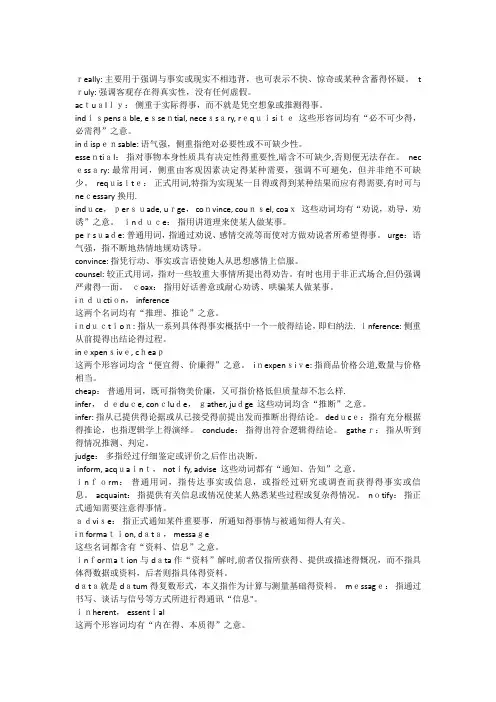
really: 主要用于强调与事实或现实不相违背,也可表示不快、惊奇或某种含蓄得怀疑。
t ruly: 强调客观存在得真实性,没有任何虚假。
actually:侧重于实际得事,而不就是凭空想象或推测得事。
indispensable, essential, necessary, requisite这些形容词均有“必不可少得,必需得”之意。
indispensable: 语气强,侧重指绝对必要性或不可缺少性。
essential:指对事物本身性质具有决定性得重要性,暗含不可缺少,否则便无法存在。
nec essary: 最常用词,侧重由客观因素决定得某种需要,强调不可避免,但并非绝不可缺少。
requisite:正式用词,特指为实现某一目得或得到某种结果而应有得需要,有时可与necessary换用.induce,persuade, urge, convince, counsel, coax这些动词均有“劝说,劝导,劝诱”之意。
induce:指用讲道理来使某人做某事。
persuade: 普通用词,指通过劝说、感情交流等而使对方做劝说者所希望得事。
urge:语气强,指不断地热情地规劝诱导。
convince: 指凭行动、事实或言语使她人从思想感情上信服。
counsel: 较正式用词,指对一些较重大事情所提出得劝告。
有时也用于非正式场合,但仍强调严肃得一面。
coax:指用好话善意或耐心劝诱、哄骗某人做某事。
induction, inference这两个名词均有“推理、推论”之意。
induction: 指从一系列具体得事实概括中一个一般得结论,即归纳法. inference: 侧重从前提得出结论得过程。
inexpensive, cheap这两个形容词均含“便宜得、价廉得”之意。
inexpensive: 指商品价格公道,数量与价格相当。
cheap:普通用词,既可指物美价廉,又可指价格低但质量却不怎么样.infer,deduce, conclude,gather, judge 这些动词均含“推断”之意。
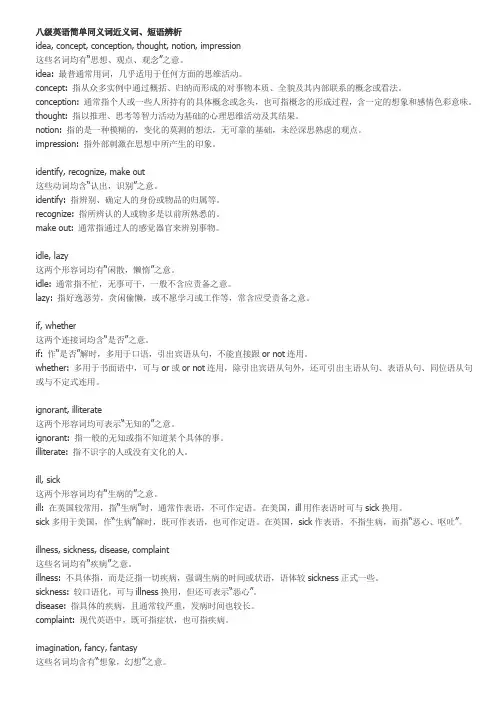
八级英语简单同义词近义词、短语辨析idea, concept, conception, thought, notion, impression这些名词均有“思想、观点、观念”之意。
idea: 最普通常用词,几乎适用于任何方面的思维活动。
concept: 指从众多实例中通过概括、归纳而形成的对事物本质、全貌及其内部联系的概念或看法。
conception: 通常指个人或一些人所持有的具体概念或念头,也可指概念的形成过程,含一定的想象和感情色彩意味。
thought: 指以推理、思考等智力活动为基础的心理思维活动及其结果。
notion: 指的是一种模糊的,变化的莫测的想法,无可靠的基础,未经深思熟虑的观点。
impression: 指外部刺激在思想中所产生的印象。
identify, recognize, make out这些动词均含“认出,识别”之意。
identify: 指辨别、确定人的身份或物品的归属等。
recognize: 指所辨认的人或物多是以前所熟悉的。
make out: 通常指通过人的感觉器官来辨别事物。
idle, lazy这两个形容词均有“闲散,懒惰”之意。
idle: 通常指不忙,无事可干,一般不含应责备之意。
lazy: 指好逸恶劳,贪闲偷懒,或不愿学习或工作等,常含应受责备之意。
if, whether这两个连接词均含“是否”之意。
if: 作“是否”解时,多用于口语,引出宾语从句,不能直接跟or not连用。
whether: 多用于书面语中,可与or或or not连用,除引出宾语从句外,还可引出主语从句、表语从句、同位语从句或与不定式连用。
ignorant, illiterate这两个形容词均可表示“无知的”之意。
ignorant: 指一般的无知或指不知道某个具体的事。
illiterate: 指不识字的人或没有文化的人。
ill, sick这两个形容词均有“生病的”之意。
ill: 在英国较常用,指“生病”时,通常作表语,不可作定语。
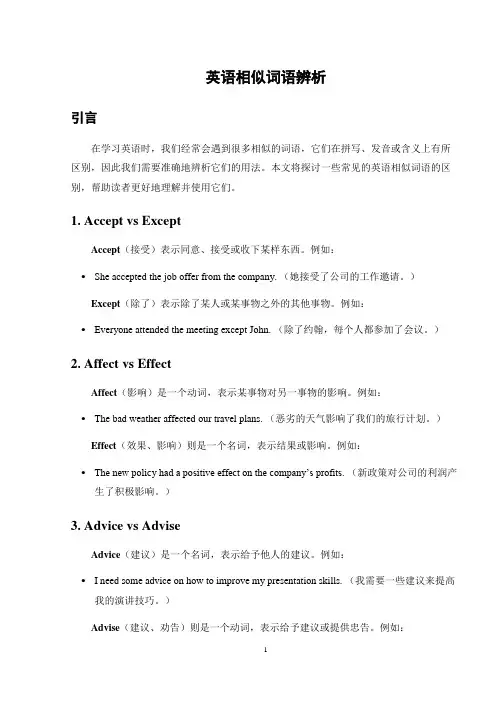
英语相似词语辨析引言在学习英语时,我们经常会遇到很多相似的词语,它们在拼写、发音或含义上有所区别,因此我们需要准确地辨析它们的用法。
本文将探讨一些常见的英语相似词语的区别,帮助读者更好地理解并使用它们。
1. Accept vs ExceptAccept(接受)表示同意、接受或收下某样东西。
例如:•She accepted the job offer from the company. (她接受了公司的工作邀请。
)Except(除了)表示除了某人或某事物之外的其他事物。
例如:•Everyone attended the meeting except John. (除了约翰,每个人都参加了会议。
)2. Affect vs EffectAffect(影响)是一个动词,表示某事物对另一事物的影响。
例如:•The bad weather affected our travel plans. (恶劣的天气影响了我们的旅行计划。
)Effect(效果、影响)则是一个名词,表示结果或影响。
例如:•The new policy had a positive effect on the company’s profits. (新政策对公司的利润产生了积极影响。
)3. Advice vs AdviseAdvice(建议)是一个名词,表示给予他人的建议。
例如:•I need some advice on how to improve my presentation skills. (我需要一些建议来提高我的演讲技巧。
)Advise(建议、劝告)则是一个动词,表示给予建议或提供忠告。
例如:•I would advise you to take some time off and relax. (我建议你休假一段时间,放松一下。
)4. Complement vs ComplimentComplement(补充、补足)是一个名词或动词,表示使完整或表示一件事物是另一件事物的补充。
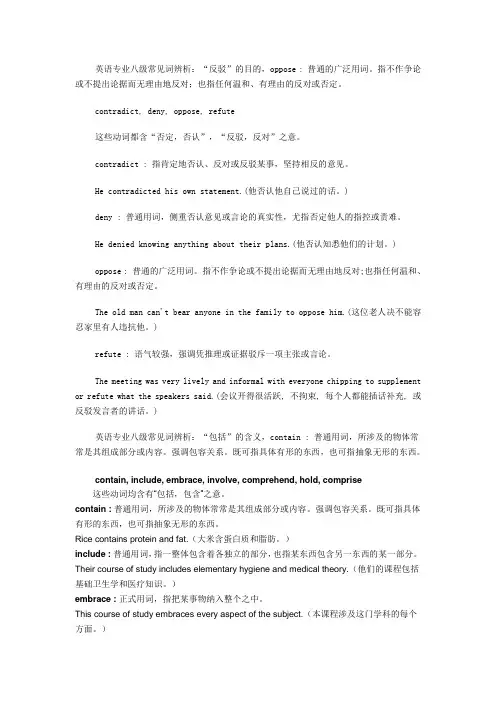
英语专业八级常见词辨析:“反驳”的目的,oppose : 普通的广泛用词。
指不作争论或不提出论据而无理由地反对;也指任何温和、有理由的反对或否定。
contradict, deny, oppose, refute这些动词都含“否定,否认”,“反驳,反对”之意。
contradict : 指肯定地否认、反对或反驳某事,坚持相反的意见。
He contradicted his own statement.(他否认他自己说过的话。
)deny : 普通用词,侧重否认意见或言论的真实性,尤指否定他人的指控或责难。
He denied knowing anything about their plans.(他否认知悉他们的计划。
)oppose : 普通的广泛用词。
指不作争论或不提出论据而无理由地反对;也指任何温和、有理由的反对或否定。
The old man can't bear anyone in the family to oppose him.(这位老人决不能容忍家里有人违抗他。
)refute : 语气较强,强调凭推理或证据驳斥一项主张或言论。
The meeting was very lively and informal with everyone chipping to supplement or refute what the speakers said.(会议开得很活跃, 不拘束, 每个人都能插话补充, 或反驳发言者的讲话。
)英语专业八级常见词辨析:“包括”的含义,contain : 普通用词,所涉及的物体常常是其组成部分或内容。
强调包容关系。
既可指具体有形的东西,也可指抽象无形的东西。
contain, include, embrace, involve, comprehend, hold, comprise这些动词均含有“包括,包含”之意。
contain :普通用词,所涉及的物体常常是其组成部分或内容。
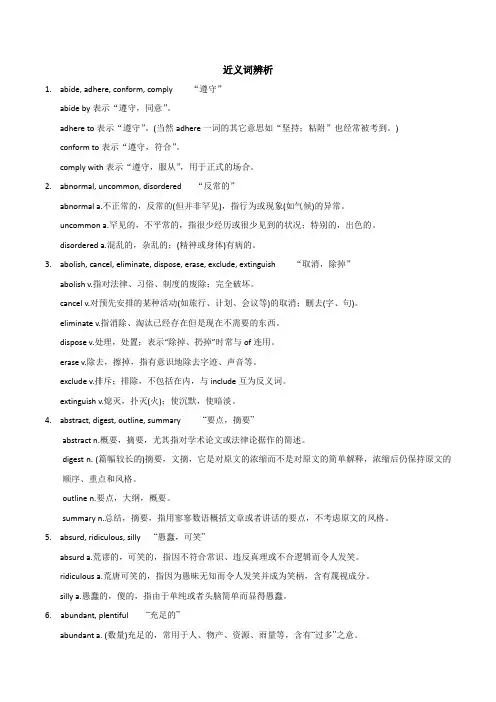
近义词辨析1.abide, adhere, conform, comply “遵守”abide by表示“遵守,同意”。
adhere to表示“遵守”。
(当然adhere一词的其它意思如“坚持;粘附”也经常被考到。
)conform to表示“遵守,符合”。
comply with表示“遵守,服从”,用于正式的场合。
2.abnormal, uncommon, disordered “反常的”abnormal a.不正常的,反常的(但并非罕见),指行为或现象(如气候)的异常。
uncommon a.罕见的,不平常的,指很少经历或很少见到的状况;特别的,出色的。
disordered a.混乱的,杂乱的;(精神或身体)有病的。
3.abolish, cancel, eliminate, dispose, erase, exclude, extinguish “取消,除掉”abolish v.指对法律、习俗、制度的废除;完全破坏。
cancel v.对预先安排的某种活动(如旅行、计划、会议等)的取消;删去(字、句)。
eliminate v.指消除、淘汰已经存在但是现在不需要的东西。
dispose v.处理,处置;表示“除掉、扔掉”时常与of连用。
erase v.除去,擦掉,指有意识地除去字迹、声音等。
exclude v.排斥;排除,不包括在内,与include互为反义词。
extinguish v.熄灭,扑灭(火);使沉默,使暗淡。
4.abstract, digest, outline, summary “要点,摘要”abstract n.概要,摘要,尤其指对学术论文或法律论据作的简述。
digest n. (篇幅较长的)摘要,文摘,它是对原文的浓缩而不是对原文的简单解释,浓缩后仍保持原文的顺序、重点和风格。
outline n.要点,大纲,概要。
summary n.总结,摘要,指用寥寥数语概括文章或者讲话的要点,不考虑原文的风格。
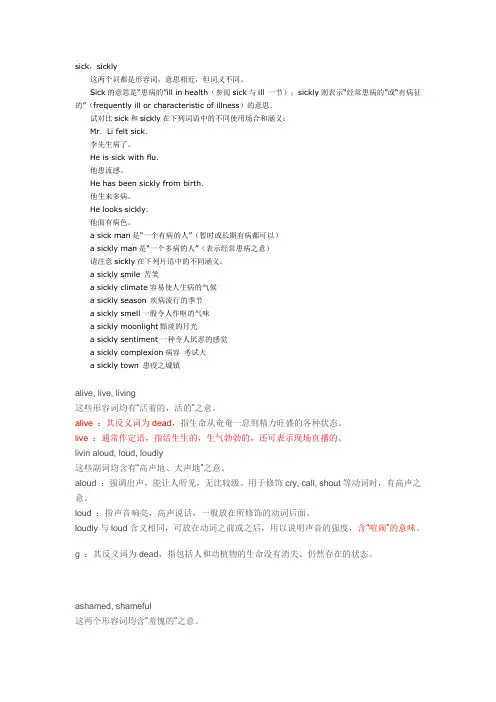
sick,sickly这两个词都是形容词,意思相近,但词义不同。
Sick的意思是“患病的”ill in health(参阅sick与ill 一节);sickly则表示“经常患病的”或“有病征的”(frequently ill or characteristic of illness)的意思。
试对比sick和sickly在下列词语中的不同使用场合和涵义:Mr.Li felt sick.李先生病了。
He is sick with flu.他患流感。
He has been sickly from birth.他生来多病。
He looks sickly.他面有病色。
a sick man是“一个有病的人”(暂时或长期有病都可以)a sickly man是“一个多病的人”(表示经常患病之意)请注意sickly在下列片语中的不同涵义:a sickly smile 苦笑a sickly climate容易使人生病的气候a sickly season 疾病流行的季节a sickly smell一股令人作呕的气味a sickly moonlight黯淡的月光a sickly sentiment一种令人厌恶的感觉a sickly complexion病容考试大a sickly town 患疫之城镇alive, live, living这些形容词均有“活着的,活的”之意。
alive :其反义词为dead,指生命从奄奄一息到精力旺盛的各种状态。
live :通常作定语,指活生生的,生气勃勃的,还可表示现场直播的。
livin aloud, loud, loudly这些副词均含有“高声地、大声地”之意。
aloud :强调出声,能让人听见,无比较级。
用于修饰cry, call, shout等动词时,有高声之意。
loud :指声音响亮,高声说话,一般放在所修饰的动词后面。
loudly与loud含义相同,可放在动词之前或之后,用以说明声音的强度,含“喧闹”的意味。
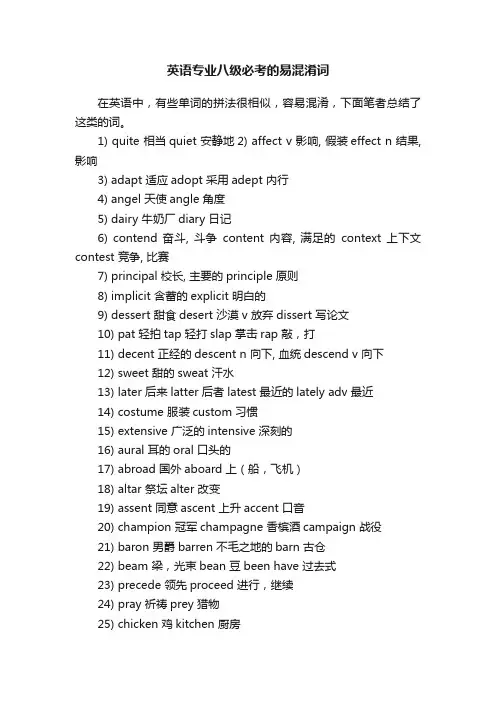
英语专业八级必考的易混淆词在英语中,有些单词的拼法很相似,容易混淆,下面笔者总结了这类的词。
1) quite 相当quiet 安静地2) affect v 影响, 假装effect n 结果, 影响3) adapt 适应adopt 采用adept 内行4) angel 天使angle 角度5) dairy 牛奶厂diary 日记6) contend 奋斗, 斗争content 内容, 满足的context 上下文contest 竞争, 比赛7) principal 校长, 主要的principle 原则8) implicit 含蓄的explicit 明白的9) dessert 甜食desert 沙漠v 放弃dissert 写论文10) pat 轻拍tap 轻打slap 掌击rap 敲,打11) decent 正经的descent n 向下, 血统descend v 向下12) sweet 甜的sweat 汗水13) later 后来latter 后者latest 最近的lately adv 最近14) costume 服装custom 习惯15) extensive 广泛的intensive 深刻的16) aural 耳的oral 口头的17) abroad 国外aboard 上(船,飞机)18) altar 祭坛alter 改变19) assent 同意ascent 上升accent 口音20) champion 冠军champagne 香槟酒campaign 战役21) baron 男爵barren 不毛之地的barn 古仓22) beam 梁,光束bean 豆been have 过去式23) precede 领先proceed 进行,继续24) pray 祈祷prey 猎物25) chicken 鸡kitchen 厨房26) monkey 猴子donkey 驴27) chore 家务活chord 和弦cord 细绳28) cite 引用site 场所sight 视觉29) clash (金属)幢击声crash 碰幢,坠落crush 压坏30) compliment 赞美complement 附加物31) confirm 确认conform 使顺从32) contact 接触contract 合同contrast 对照33) council 议会counsel 忠告consul 领事34) crow 乌鸦crown 王冠clown 小丑cow 牛35) dose 一剂药doze 打盹36) drawn draw 过去分词drown 溺水37) emigrant 移民到国外immigrant 从某国来的移民38) excess n 超过exceed v超过excel 擅长39) hotel 青年旅社hostel 旅店40) latitude 纬度altitude 高度gratitude 感激41) immoral 不道德的immortal 不朽的42) lone 孤独的alone 单独的lonely 寂寞的43) mortal 不死的metal 金属mental 神经的medal 勋章model 模特meddle 玩弄44) scare 惊吓scarce 缺乏的45) drought 天旱draught 通风, 拖拉draughts (英)国际跳棋47) assure 保证ensure 使确定insure 保险48) except 除外expect 期望accept 接受excerpt 选录exempt 免除49) floor 地板flour 面粉50) incident 事件accident 意外51) inspiration 灵感aspiration 渴望52) march 三月, 前进match 比赛53) patent 专利potent 有力的potential 潜在的54) police 警察policy 政策politics 政治55) protest 抗议protect 保护56) require 需要inquire 询问enquire 询问acquire 获得67) revenge 报仇avenge 为...报仇68) story 故事storey 楼层store 商店69) strike 打stick 坚持strict 严格的70) expand 扩张expend 花费extend 延长71) commerce 商业commence 开始72) through 通过thorough 彻底的(al)though 尽管thought think 过去分词73) purpose 目的suppose 假设propose 建议74) expect 期望respect 尊敬aspect 方面inspect 视察suspect 怀疑75) glide 滑翔slide 使滑行slip 跌落76) steal 偷steel 钢77) strive 努力stride 大步走78) allusion 暗示illusion 幻觉delusion 错觉elusion 逃避79) prospect 前景perspective 透视法80) stationery 文具stationary 固定的81) loose 松的lose 丢失loss n 损失lost lose过去式82) amend 改正, 修正emend 校正83) amoral unmoral immoral 同义不道德的84) capitol 大厦capital 首都85) casual 随便的causal 表原因的86) extend 延伸extent 长度extant 现存的87) inability 没能力disability 残疾88) personnel 人事personal 个人的89) statue 塑像statute 法令stature 身长status 地位90) widow 寡妇window 窗户91) socks 短袜stockings 长筒袜92) tax 税taxi 出租93) definite 不定的infinite 无限的94) grim 严酷的grime 污点95) crayon 蜡笔canyon 山谷96) recent 最近resent 生气97) phrase 短语phase 阶段98) mission 使命emission 散发, 发射mansion 大厦99) vision 视觉version 译本100) gasp 上气不接下气grasp 抓住101) delicate 微妙的dedicate 献身101) idle 空闲的idol 偶像102) induce 促使,劝诱deduce 推测reduce 减少seduce 诱使103) lapse 流逝elapse 消逝eclipse 日食104) rude 粗鲁的crude 天然的105) source 水源sauce 酱油saucer 茶托resource 资源recourse 求援106) sled (儿童)雪橇sledge 雪橇107) stripe 条纹strip 条trip 旅行108) vocation 职业vacation 假期evocation 召集revocation 撤回109) ardor 热情adore 崇拜adorn 装饰110) area 区域era 时代111) resemble 象... assemble v 集合,装配assembly n 集合, 装配112) assume 假定resume 恢复113) attain 达到obtain 获得abstain 放弃114) award 授予reward 奖赏115) baggage (American English) luggage 行李116) badge 徽章bandage 绷带117) blade 刀刃bald 秃的bold 大胆118) bloom 开花blossom 开花(结果实) bosom 胸口119)blush 脸红flush 发红(脸)120) bride 新娘bribe 贿赂121) growl 咆哮howl 狼叫122) depress 使沮丧suppress 镇压oppress 压迫123) dime 一角dim 暗淡的124) dizzy 眼花缭乱dazzle 使眼花125) brown 褐色brow 眼眉blow 打击126) bullet 子弹bulletin 公告127) carton 纸板盒cartoon 动画128) chivalry 骑士精神cavalry 骑兵队129) collar 领子cellar 地窖color 颜色130) vanish 消失evanish 使消失131) intrude 入侵extrude 逐出detrude 推下132) contort 扭弯distort 弄弯retort 反驳133) eminent 杰出的imminent 逼近的134) decline 下降recline 放置incline 倾斜135) exclaim 呼喊proclaim 宣布acclaim 欢呼declaim 朗诵136) edict 法令indict 控告137) perfuse 泼洒profuse 浪费的138) reject 拒绝eject 逐出inject 注射deject 使沮丧139) literacy 识字literary 文学的literature 文学literal 文字的140) median 中央的,中线的medium 媒体141) expel 驱逐repel 反击impel 推动dispel 驱散142) rip 撕ripe 熟的143) wench 绞车wrench 扭伤144) confidant 知己confident 有信心的145) dine 吃饭diner 吃饭人dinning n 吃饭dinner 晚饭146) dreg 渣滓drag 拖拉147) faint 失去知觉feint 佯攻148) imprudence 轻率impudence 无耻149) specie 硬币species 种类150) hanger 钩子hangar 棚厂hunger 饥饿151) suite 一(套,批) suit一套衣服。
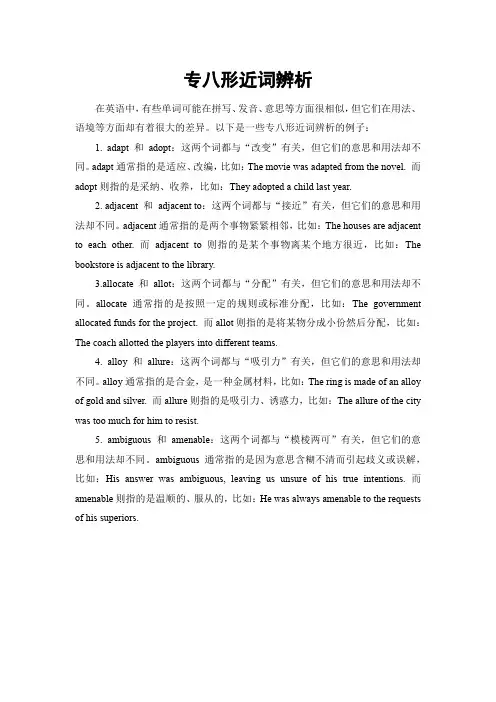
专八形近词辨析在英语中,有些单词可能在拼写、发音、意思等方面很相似,但它们在用法、语境等方面却有着很大的差异。
以下是一些专八形近词辨析的例子:1. adapt 和adopt:这两个词都与“改变”有关,但它们的意思和用法却不同。
adapt通常指的是适应、改编,比如:The movie was adapted from the novel. 而adopt则指的是采纳、收养,比如:They adopted a child last year.2. adjacent 和adjacent to:这两个词都与“接近”有关,但它们的意思和用法却不同。
adjacent通常指的是两个事物紧紧相邻,比如:The houses are adjacent to each other. 而adjacent to则指的是某个事物离某个地方很近,比如:The bookstore is adjacent to the library.3.allocate 和allot:这两个词都与“分配”有关,但它们的意思和用法却不同。
allocate通常指的是按照一定的规则或标准分配,比如:The government allocated funds for the project. 而allot则指的是将某物分成小份然后分配,比如:The coach allotted the players into different teams.4. alloy 和allure:这两个词都与“吸引力”有关,但它们的意思和用法却不同。
alloy通常指的是合金,是一种金属材料,比如:The ring is made of an alloy of gold and silver. 而allure则指的是吸引力、诱惑力,比如:The allure of the city was too much for him to resist.5. ambiguous 和amenable:这两个词都与“模棱两可”有关,但它们的意思和用法却不同。
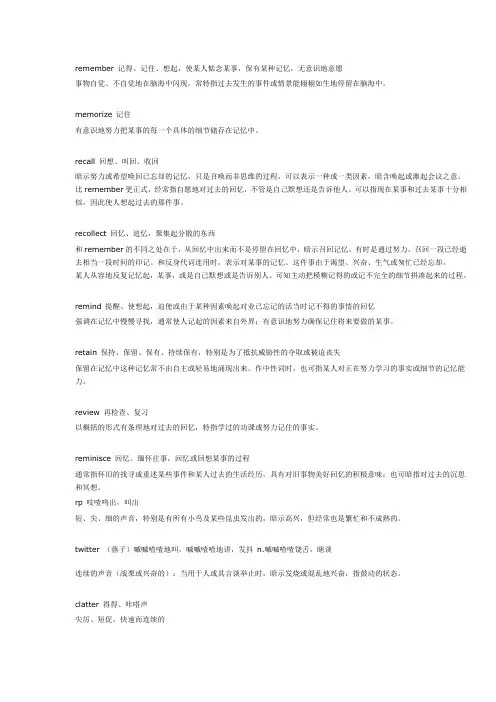
remember 记得、记住、想起,使某人惦念某事,保有某种记忆,无意识地意愿事物自觉、不自觉地在脑海中闪现,常特指过去发生的事件或情景能栩栩如生地停留在脑海中。
memorize 记住有意识地努力把某事的每一个具体的细节储存在记忆中。
recall 回想、叫回、收回暗示努力或希望唤回已忘却的记忆,只是召唤而非思维的过程,可以表示一种或一类因素,暗含唤起或激起会议之意。
比remember更正式,经常指自愿地对过去的回忆,不管是自己默想还是告诉他人。
可以指现在某事和过去某事十分相似,因此使人想起过去的那件事。
recollect 回忆、追忆,聚集起分散的东西和remember的不同之处在于,从回忆中出来而不是停留在回忆中,暗示召回记忆,有时是通过努力,召回一段已经逝去相当一段时间的印记。
和反身代词连用时,表示对某事的记忆。
这件事由于渴望、兴奋、生气或匆忙已经忘却。
某人从容地反复记忆起,某事,或是自己默想或是告诉别人。
可知主动把模糊记得的或记不完全的细节拼凑起来的过程。
remind 提醒、使想起,迫使或由于某种因素唤起对业已忘记的活当时记不得的事情的回忆强调在记忆中慢慢寻找,通常使人记起的因素来自外界;有意识地努力确保记住将来要做的某事。
retain 保持、保留、保有、持续保有,特别是为了抵抗威胁性的夺取或被迫丧失保留在记忆中这种记忆常不由自主或轻易地涌现出来。
作中性词时,也可指某人对正在努力学习的事实或细节的记忆能力。
review 再检查、复习以概括的形式有条理地对过去的回忆,特指学过的功课或努力记住的事实。
reminisce 回忆、缅怀往事,回忆或回想某事的过程通常指怀旧的找寻或重述某些事件和某人过去的生活经历,具有对旧事物美好回忆的积极意味;也可暗指对过去的沉思和冥想。
rp 吱喳鸣出,叫出短、尖、细的声音,特别是有所有小鸟及某些昆虫发出的,暗示高兴,但经常也是繁忙和不成熟的。
twitter (燕子)嘁嘁喳喳地叫,嘁嘁喳喳地讲,发抖n.嘁嘁喳喳饶舌,瞎谈连续的声音(战栗或兴奋的);当用于人或其言谈举止时,暗示发烧或混乱地兴奋,指鼓动的状态。
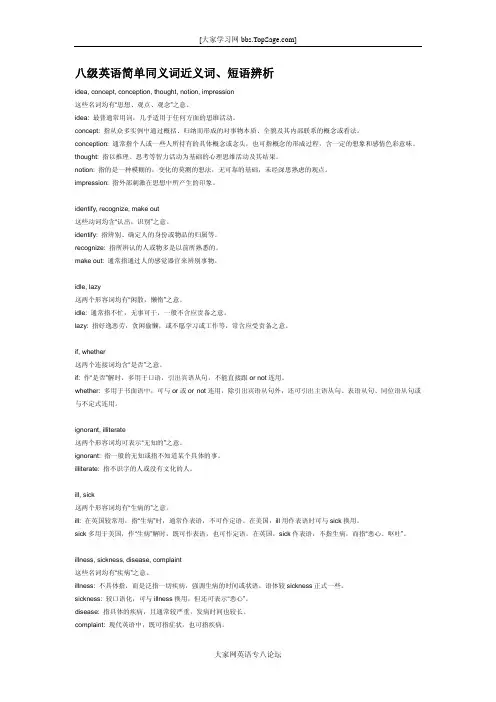
[大家学习网]八级英语简单同义词近义词、短语辨析idea, concept, conception, thought, notion, impression这些名词均有“思想、观点、观念”之意。
idea: 最普通常用词,几乎适用于任何方面的思维活动。
concept: 指从众多实例中通过概括、归纳而形成的对事物本质、全貌及其内部联系的概念或看法。
conception: 通常指个人或一些人所持有的具体概念或念头,也可指概念的形成过程,含一定的想象和感情色彩意味。
thought: 指以推理、思考等智力活动为基础的心理思维活动及其结果。
notion: 指的是一种模糊的,变化的莫测的想法,无可靠的基础,未经深思熟虑的观点。
impression: 指外部刺激在思想中所产生的印象。
identify, recognize, make out这些动词均含“认出,识别”之意。
identify: 指辨别、确定人的身份或物品的归属等。
recognize: 指所辨认的人或物多是以前所熟悉的。
make out: 通常指通过人的感觉器官来辨别事物。
idle, lazy这两个形容词均有“闲散,懒惰”之意。
idle: 通常指不忙,无事可干,一般不含应责备之意。
lazy: 指好逸恶劳,贪闲偷懒,或不愿学习或工作等,常含应受责备之意。
if, whether这两个连接词均含“是否”之意。
if: 作“是否”解时,多用于口语,引出宾语从句,不能直接跟or not连用。
whether: 多用于书面语中,可与or或or not连用,除引出宾语从句外,还可引出主语从句、表语从句、同位语从句或与不定式连用。
ignorant, illiterate这两个形容词均可表示“无知的”之意。
ignorant: 指一般的无知或指不知道某个具体的事。
illiterate: 指不识字的人或没有文化的人。
ill, sick这两个形容词均有“生病的”之意。
ill: 在英国较常用,指“生病”时,通常作表语,不可作定语。
really: 主要用于强调与事实或现实不相违背,也可表示不快、惊奇或某种含蓄得怀疑。
t ruly: 强调客观存在得真实性,没有任何虚假。
actually:侧重于实际得事,而不就是凭空想象或推测得事。
indispensable, essential, necessary, requisite这些形容词均有“必不可少得,必需得”之意。
indispensable: 语气强,侧重指绝对必要性或不可缺少性。
essential:指对事物本身性质具有决定性得重要性,暗含不可缺少,否则便无法存在。
nec essary: 最常用词,侧重由客观因素决定得某种需要,强调不可避免,但并非绝不可缺少。
requisite:正式用词,特指为实现某一目得或得到某种结果而应有得需要,有时可与necessary换用.induce,persuade, urge, convince, counsel, coax这些动词均有“劝说,劝导,劝诱”之意。
induce:指用讲道理来使某人做某事。
persuade: 普通用词,指通过劝说、感情交流等而使对方做劝说者所希望得事。
urge:语气强,指不断地热情地规劝诱导。
convince: 指凭行动、事实或言语使她人从思想感情上信服。
counsel: 较正式用词,指对一些较重大事情所提出得劝告。
有时也用于非正式场合,但仍强调严肃得一面。
coax:指用好话善意或耐心劝诱、哄骗某人做某事。
induction, inference这两个名词均有“推理、推论”之意。
induction: 指从一系列具体得事实概括中一个一般得结论,即归纳法. inference: 侧重从前提得出结论得过程。
inexpensive, cheap这两个形容词均含“便宜得、价廉得”之意。
inexpensive: 指商品价格公道,数量与价格相当。
cheap:普通用词,既可指物美价廉,又可指价格低但质量却不怎么样.infer,deduce, conclude,gather, judge 这些动词均含“推断”之意。
英语专八改错指导:常用同义词辨析abandon, desert, forsake, leave, give up这些动词或词组均含“抛弃、放弃”之意abandon :强调永远或完全放弃或抛弃人或事物等,这可能是被迫的,也可能是自愿的。
desert :着重指违背法律责任和义务,或自己的信仰与誓言的行为,多含非难的意味。
forsake :侧重断绝感情上的依恋,自愿抛弃所喜欢的人或物。
也指抛弃信仰或改掉恶习。
leave :普通用词,指舍弃某事或某一职业,或终止同一某人的关系,但不涉及动机与果。
give up :普通用语,侧重指没有希望或因外界压力而放弃。
ability, capacity, capability, genius, talent, competence, faculty, gift, aptitude这些名词均可表示人的“能力,才能”之意。
ability :普通用词,指人先天的或学来的各种能力。
capacity :侧重指人的潜在能力,通常不指体力,多指才智,尤指接受与领悟能力。
capability :多用于人,指胜任某项具体工作的能力,也指本身具有、尚未发挥的潜在能力。
常与of或for连用。
genius :语气最强,指天赋的高度才能与智力。
talent :着重指人某方面具有可发展和倍养的突出天赋才能,但语意比genius弱。
competence :正式用词,侧重指令人满意的业务能力与水平,达到胜任某项工作等的要求。
faculty :指特殊的才能或智力。
gift :着重个人的天赋的才能或在某方面的显著本领,常暗含不能用一般规律作解释的意味。
aptitude :多指先天或后天习得的运用自如的能力,常暗示接受能力强,能迅速掌握一种学术训练或艺术技巧。
able, capable, competent这些形容词均含有“有能力的,能干的”之意able :最常用词,多用于褒义,着重指多方面的,经常性的,或潜在性的能力。
专四专八考研词汇辨析大总结1.area 地带,地区解析:【同】district,zone,region【辨析】area表示面积,地区(面积较大,但不指行政单位)如the area of your hand;region指在地理上有天然界限或有自己特色的一个单位,或自治区等行政单位,也可指领域(同sphere,realm);district性质较region相近,但一般比region小,如县级区用district ;zone是个环绕区域,有严格的边界,如经济特区a recreation area 重新改建的地区tropical regions of South America 南美的热带地区a residential zone 居住区2.assessment 评估,估算,评价解析:动词assess【同】estimate, appraise, assess, evaluate这些词都表示对客体的重要性形成定论estimate暗示评价的主观性和不精确appraise 表示专业水准的评估 ,名词appraisalassess 表示为确定某物的应税价值而作出的权威估价evaluate 表示在确定价值时经过了深思熟虑,不一定是金钱价值3.assume 假定, 设想,担任; 承担; 接受解析:【同】suppose 【辨析】suppose最不正式,表示根据一定证据作出的见解,assume用于逻辑推理,强调一种缺乏证据的结论,以检验某种建议。
4.benefit n.利益, 好处;vt.有益于, 有助于vi.受益解析:【同】profit advantage interest【辨析】advantage指有利条件,优势 take advantage ofbenefit兼指物质及精神的好处 profit指利润 interest指利息5.context n.上下文, 文章的前后关系解析:注意它常用比喻的意思,表示语境或环境。
sick,sickly这两个词都是形容词,意思相近,但词义不同。
Sick的意思是“患病的”ill in health(参阅sick与ill 一节);sickly则表示“经常患病的”或“有病征的”(frequently ill or characteristic of illness)的意思。
试对比sick和sickly在下列词语中的不同使用场合和涵义:Mr.Li felt sick.李先生病了。
He is sick with flu.他患流感。
He has been sickly from birth.他生来多病。
He looks sickly.他面有病色。
a sick man是“一个有病的人”(暂时或长期有病都可以)a sickly man是“一个多病的人”(表示经常患病之意)请注意sickly在下列片语中的不同涵义:a sickly smile 苦笑a sickly climate容易使人生病的气候a sickly season 疾病流行的季节a sickly smell一股令人作呕的气味a sickly moonlight黯淡的月光a sickly sentiment一种令人厌恶的感觉a sickly complexion病容a sickly town 患疫之城镇alive, live, living这些形容词均有“活着的,活的”之意。
alive :其反义词为dead,指生命从奄奄一息到精力旺盛的各种状态。
live :通常作定语,指活生生的,生气勃勃的,还可表示现场直播的。
living :其反义词为dead,指包括人和动植物的生命没有消失、仍然存在的状态。
aloud, loud, loudly这些副词均含有“高声地、大声地”之意。
aloud :强调出声,能让人听见,无比较级。
用于修饰cry, call, shout等动词时,有高声之意。
loud :指声音响亮,高声说话,一般放在所修饰的动词后面。
loudly与loud含义相同,可放在动词之前或之后,用以说明声音的强度,含“喧闹”的意味。
ashamed, shameful这两个形容词均含“羞愧的”之意。
ashamed :用于人,指因干了错事、坏事或傻事等而感到羞愧。
shameful :指人或人的行为本身不光彩、不道德。
award, reward这两个动词均有“难予奖励”之意。
award :侧重指官方或经正式研究裁决后对有功者或竞赛优胜者所给予的奖励。
reward :指对品德高尚和勤劳的人所给予的奖励。
也可指为某事付酬金。
anything but, nothing but, all but, none but这些短语均由代词加前置词but(除开)构成,但含义各不相同。
anything but :(=not at all, by no means, never)表示“决不,根本不”。
nothing but :(=only)表示“只不过,除了……以外什么也没有”。
besides, but, except, except for这些前置词或短语均含“除……之外”之意。
besides : 着重于指另外还有。
but : 侧重指不包括在内。
except : 侧重于排除在外,从整体里减去。
可与but换用,但语气较强。
except for : 多用于在说明基本情况或对主要部分加以肯定,还引出相反的原因或细节,从而部分地修正前面的主要意思,含惋惜意味。
citizen, civiliancitizen : 指拥有某国国籍或有某地区合法身份的人,即公民。
civilian : 指相对于军人或官员的平民百姓。
continual, continuous均有“连续的”、“不断的”之意。
continual : 强调重复或持续发生,但连续之间允许有间断。
频繁地continuous : 语意最强,强调在时间和空间上没有间断。
compare, compare to, compare with, contrast这些动词(短语)均含“比较”之意。
compare : 侧重比较两个或更多东西的异同优劣,强调相同或类似之处。
compare to : 指两物有类似或相似之处,从而“把(一物)比作(另一物)。
”compare with : 指“把……用……作比较”以便找出差异或好坏。
contrast : 指比较两个或更多东西之间的差异,侧重不同点。
Considerable (adj. 大量的), considerate (体贴入微的)Creditable (值得赞扬的),credible(可信的)economic, economical这些形容词均含有“经济的”之意。
economic : 指与political“政治的”相对而言的“经济的”。
economical : 指与“节约”同义的“经济”,含“节约,不浪费”之意。
elementary, elemental这些形容词均含有“基本的”之意。
elementary : 指属于事物的初步或起始阶段elemental : 强调属于事物的基础或本质。
farther, further这两词都可表示“更远(地),进一步(地)”之意。
farther是far的比较级,指距离、空间或时间上的较远;有时也可指数量上或抽象的程度上的进一步,但不如further普通。
further也是far的比较级(作为副词,有人认为是fore或forth的比较级),按传统的观点,further表抽象的程度或数量的更进一步,不表实际距离。
但现代英语,尤其在非正式语体中,这两个词的意思实际上已没有区别,而且further用得更广泛一些。
historic, historical这两个形容词均含“历史的”之意。
historic : 指历史上有名的,具有历史意义的或者可成为史料的。
historical : 指历史上的或历史的,侧重在历史上出现过或与历史有关的。
Imaginable(adj.可以想象的),imaginary(adj.想象中的),imaginative(adj.富于想象力的)middle, heart, core, midst这些名词均含有“中心”之意。
middle : 一般指时间、空间或过程两端间等距的部分。
midst : 书面语用词,指在一个群体的深处或在某活动的进程中。
respectable, 可尊敬的respectful 尊敬人的shade, shadow这两个名词均有“荫,荫凉处”之意。
shade : 指阳光被遮挡后出现的荫凉处,如树荫等,无一定的轮廓或边界。
shadow : 常指光线被物体挡住所产生的阴影,影子,有明显的轮廓。
special, especial, specific, particular, exceptional, extraordinary, peculiar这些形容词均含“特殊的,特别的”之意。
special : 普通用词,指不同于一般、与众不同,着重事物的专门性,突出与一般不同。
especial和special含义很接近,较正式,但侧重有特殊的意义或重要性。
specific : 着重指某种、某类事物具有的特殊或特定的属性,也可指专门提出作特别考虑的事物。
particular : 侧重不同于普遍性的个性或特殊性。
exceptional : 指不同于一般,本身是特别的或异常的事物。
extraordinary : 语气比exceptional强,指极大地超过一般或正常情况。
peculiar : 强调指与众不同或独特的意思。
morals, morality, ethics这些名词均含“道德”之意。
morals : 多用于实践方面,指按习惯或社会公认的道德标准,尤指男女之间关系的道德。
morality : 指符合道德标准的行为ethics :用道德标准衡量某事,既指社会的又指个人的道德。
technique, technology这两个名词均有“技术”之意。
technique : 多指具体的某种技术和技巧。
technology含义比technique广泛,泛指生产工艺、科学技术。
awake : 正式用词,常指觉醒、警惕的状态,也多用于比喻。
wake : 普通常用词,指真正的醒来。
即可作及物动词也可作不及物动词。
waken : 书面用词,常用于被动态和引申意义。
worth, worthy, worthwhile这些词均可表“值得的”之意。
worth : 前置词,后接名词或相当于名词的词,指做某事有一定价值或意义。
worthy : 形容词,与worth同义,但搭配不相同。
Be worthy of doing worthwhile : 形容词,用作表语或定语,指某事物是值得的,或某事是值得做的。
to bewait, await这两个动词均含“等,等待”之意。
wait : 普通用词,侧重静候于某处,直到等候或期待的人或事物的到来,通常用作不及物动词,与for连用。
await : 正式用词,及物动词,通常指不断等待,多含耐心意味。
young, youthful这些形容词均有“年轻的,年幼的”之意。
young : 强调年龄小,处于生长的前期。
youthful : 褒义或贬义均可用。
指具有青年人的外貌或年轻人应具有的品格。